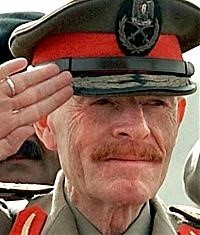Andrew McGregor
April 2, 2010
Izzat Ibrahim al-Duri, leader of the Iraqi Ba’ath party and commander of the Jihad and Liberation Front (a coalition of Iraqi resistance groups formed in 2007), has issued a statement urging the Arab League to act promptly to foil what he described as American and Iranian plans for the permanent occupation of Iraq.
Al-Duri’s exact whereabouts are unknown, but he is believed to operate from Syria. Despite ill health, he has continued to exert the same influence within the Ba’athist party and its allies as he did when he served Saddam Hussein as Vice President of Iraq and Deputy Chairman of the Revolutionary Command Council. The Ba’athist leader opposes al-Qaeda, blaming its “strategic errors” for preventing the collapse of the occupation in its first year (al-Moharer.net, July 20, 2008).
Al-Duri, perhaps aware that repeated calls for support against American occupation in Iraq have gone unheeded for seven years, ties his appeal to the Arab nations’ new-found fear of Iranian intentions in the region, suggesting that Washington and Tehran are cooperating to eliminate the Sunnis of Iraq before moving on to the rest of the Arab Middle East. He reminds the Arab leaders of the immense sacrifice made by Iraqis to repel Iranian forces in the 1980-1988 war between the two neighbors. Al-Duri describes this conflict as a “Persian attack on the ummah (the global Muslim community),” rather than an attack on Iraq.
The Ba’athist leader goes on to express the disappointment of the resistance in the Arab League nations in failing to support the Iraqi people. Al-Duri notes the Iraqi people are besieged:
Unfortunately, the strangest thing is that they are besieged by those who are supposed to be their initial and strategic depth in all national, patriotic, human, religious, and moral standards. The Iraqi people have been, and still are, besieged by the official Arab regimes, except for a very few. To date, there are some Arab rulers, who have not only imposed a siege and blockade, but also put all their weight, as well as their country’s weight and capabilities at the service of the occupier and its collaborators.
The statement also implicates Iran in the American occupation from the beginning:
Iran, the neighbor of vice, rancor, and hatred for the ummah, its history, and message, unfortunately helped and facilitated the invasion and occupation of Iraq and powerfully cooperated with this superpower to destroy Iraq’s growth and civilization… You have to know too that the United States handed Iraq over to Iran on a silver platter…
Al-Duri interprets the withdrawal of occupation troops from Iraq’s urban areas as a victory for the resistance, but ultimate victory and independence is being foiled by Iraq’s “Quislings,” its Shi’a politicians. According to al-Duri, the time is right for the Arab nation to assert itself in the interest of “freedom and independence,” as is being done by nations “lesser in numbers and potential,” such as Venezuela, Nicaragua, Cuba, Vietnam, Korea, Turkey, Russia and even Iran.
Al-Duri asks the Arab leaders to take six decisions:
1. To acknowledge that the armed and unarmed Iraqi resistance is pursuing its legitimate right to resist occupation under international and religious law.
2. To expel all representatives of the Baghdad government and invite representatives of the resistance to represent Iraq in the Arab League.
3. To sever diplomatic relations with the Baghdad government and cancel all existing commitments to that government.
4. To implement the Arab League’s Joint Defense Agreement. Article 2 of the agreement calls on all member states to “go without delay to the aid of the State or States against which an act of [armed] aggression is made.”
5. To provide humanitarian support for the Iraqi people, who are “threatened by the disaster of annihilation.”
6. To exert pressure “by all means possible” on the United States to abandon Iran and withdraw immediately.
After mentioning the work of a number of resistance groups fighting in south Iraq, al-Duri says the next phase of the conflict will see the resistance fighting the enemy “on every inch of Iraqi soil.” If the United States insists on its support for the “Iranian Safavid expansionist project, we will fight and pursue it… We will not be deceived by the enemy’s withdrawal of its forces or part of them.”
This article first appeared in the April 2, 2010 issue of the Jamestown Foundation’s Terrorism Monitor

